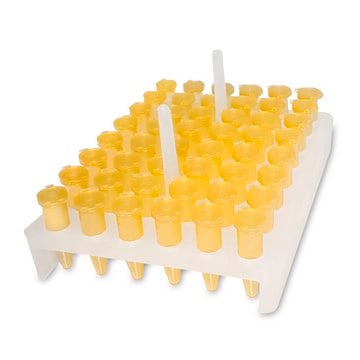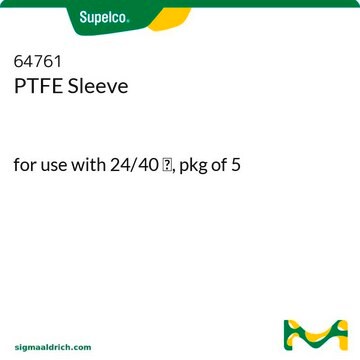Z744270
Wilmad® Suprasil® Electrolytic Assembley
for use with Joel, pack of 1
Synonyme(s) :
EPR kinetic study assembly, electrolytic cell assembly
Se connecterpour consulter vos tarifs contractuels et ceux de votre entreprise/organisme
About This Item
Code UNSPSC :
41115600
Nomenclature NACRES :
NB.15
Produits recommandés
Conditionnement
pack of 1
Fabricant/nom de marque
Wilmad WG-810-J-Q
Compatibilité
for use with Joel
Vous recherchez des produits similaires ? Visite Guide de comparaison des produits
Description générale
Electrochemistry is employed in many EPR kinetic studies to generate free radicals and avoids alkali metal reductions, the associated sample sensitivity to air or moisture and background signal. A complete cell includes two Calomel Reference Electrodes, a pair of Platinum Electrodes, and a gas bubbler for deoxygenation. The Electrolytic Cell Assembly comes as a complete unit with CFQ or Suprasil® Flat Cell. The Flat Electrolytic Cells have two Standard Taper 10/30 outer joints at the top, one for the Gas Bubbler and a Platinum Electrode and at the botom a single Standard Taper 5/20 outer joint for the other Platinum Electrode, the remainder of the Flat Cell is CFQ. A minimum 15mL of sample solution needs to make contact with the electrodes and gas bubbler. The cell width for
JEOL spectrometers is 10mm outside (WG-810-J-Q), for other spectrometers, the cell width is 10.5mm outside (WG-810-Q). The Gas Bubbler Assembly is a three-piece Pyrex® chamber which holds part of your sample it has three Standard Taper 10/30 outer joints at the top for the Gas Bubbler and two Calomel Electrodes. The lower Standard Taper 10/30 inner joint fits into the top of the Flat Electrolytic Cell. Nitrogen should be bubbled through the solution before and during the experiment to remove paramagnetic oxygen and mix the sample during electrolysis. The Platinum Electrodes are prepared using 0.016? (0.4mm) diameter wire. The upper electrode, WG-810-C, uses 8? (203mm) of platinum and acts as the working electrode in oxidation reactions. The lower electrode, WG-810-D, has only 2? (50mm) of platinum and acts as the auxiliary electrode in oxidation reactions. If you add a few drops of mercury to the cell, the lower electrode can be used as the working cathode in reduction reactions. Each Platinum Electrode incorporates a Pt-to-W weld. The tungsten (W) external wire lets you quickly clip your potentiostat leads to the electrode.Electrolysis Limits in Water (vs. Saturated Calomel Electrode)
JEOL spectrometers is 10mm outside (WG-810-J-Q), for other spectrometers, the cell width is 10.5mm outside (WG-810-Q). The Gas Bubbler Assembly is a three-piece Pyrex® chamber which holds part of your sample it has three Standard Taper 10/30 outer joints at the top for the Gas Bubbler and two Calomel Electrodes. The lower Standard Taper 10/30 inner joint fits into the top of the Flat Electrolytic Cell. Nitrogen should be bubbled through the solution before and during the experiment to remove paramagnetic oxygen and mix the sample during electrolysis. The Platinum Electrodes are prepared using 0.016? (0.4mm) diameter wire. The upper electrode, WG-810-C, uses 8? (203mm) of platinum and acts as the working electrode in oxidation reactions. The lower electrode, WG-810-D, has only 2? (50mm) of platinum and acts as the auxiliary electrode in oxidation reactions. If you add a few drops of mercury to the cell, the lower electrode can be used as the working cathode in reduction reactions. Each Platinum Electrode incorporates a Pt-to-W weld. The tungsten (W) external wire lets you quickly clip your potentiostat leads to the electrode.Electrolysis Limits in Water (vs. Saturated Calomel Electrode)
Application
EPR
Caractéristiques et avantages
- Complete cell includes two Calomel Reference Electrodes, a pair of Platinum Electrodes, and a gas bubbler
- Electrolytic Cell Assembly comes as a complete unit with CFQ or Suprasil® Flat Cell
Informations légales
PYREX is a registered trademark of Corning, Inc.
Suprasil is a registered trademark of HERAEUS QUARZGLAS GMBH & CO.
Wilmad is a registered trademark of SP Industries
Certificats d'analyse (COA)
Recherchez un Certificats d'analyse (COA) en saisissant le numéro de lot du produit. Les numéros de lot figurent sur l'étiquette du produit après les mots "Lot" ou "Batch".
Déjà en possession de ce produit ?
Retrouvez la documentation relative aux produits que vous avez récemment achetés dans la Bibliothèque de documents.
Notre équipe de scientifiques dispose d'une expérience dans tous les secteurs de la recherche, notamment en sciences de la vie, science des matériaux, synthèse chimique, chromatographie, analyse et dans de nombreux autres domaines..
Contacter notre Service technique








